#State of Amazonas
Explore tagged Tumblr posts
Text
LOS ANGELES LAKERS X ATLANTA HAWKS | (NARRAÇÃO AO VIVO) | TEMPORADA REGULAR 2024/25

Full Watch Here https://sfl.gl/8C1Llkk
#Federal District#State of Acre#State of Alagoas#State of Amapá#State of Amazonas#State of Bahia#State of Ceará#State of Esp��rito Santo#State of Goiás#State of Maranhão#State of Mato Grosso#State of Mato Grosso do Sul#State of Minas Gerais#State of Pará#State of Paraíba#State of Paraná#State of Pernambuco#State of Piauí#State of Rio de Janeiro#State of Rio Grande do Norte#State of Rio Grande do Sul#State of Rondônia#State of Roraima#State of Santa Catarina#State of São Paulo#State of Sergipe#State of Tocantins#LakersVsHawks#NBA2025#LiveGame
0 notes
Text

Lábrea, State of Amazonas, Brazil
0 notes
Text
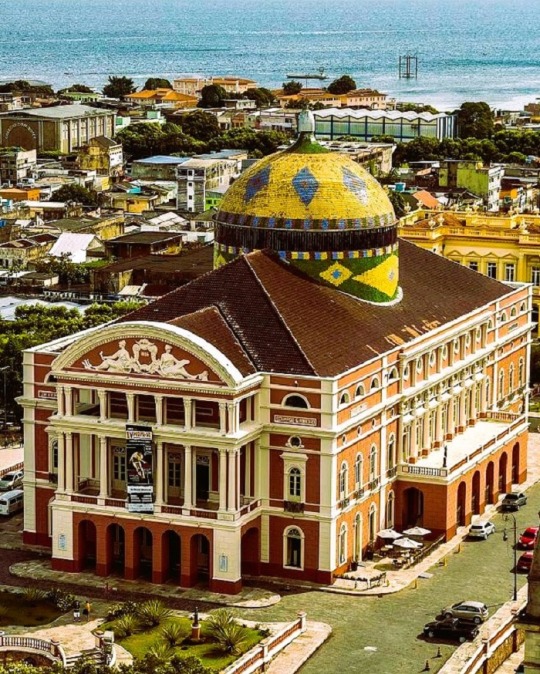
Amazon Theatre, Manaus, Brazil: Deep within the lush embrace of the Amazon Rainforest stands the remarkable Teatro Amazonas, a testament to human ingenuity and artistic expression. It took over 15 years to construct the theater, with artists, designers, and materials imported from Europe, to create a one-of-a-kind cultural institution... The Amazon Theatre is an opera house located in Manaus, in the heart of the Amazon rainforest in Brazil. Wikipedia
228 notes
·
View notes
Text

✯ Round 1 ✯ Match 105 ✯
The current flag of Parintins, Amazonas, Brazil

Propaganda:
None
vs.
The current flag of Bienville Parish, Louisiana, United States

Propaganda:
It makes you feel something
Tournament Policies: ✯ Choose the flag that's more meaningful to you! ✯ Be respectful of place names and cultural symbols in your commentary! ✯ If you want to submit propaganda, you may do so at the submission form linked in the pinned post. It will only be included if it is submitted before the next post with that flag is drafted and will be included in all subsequent posts the flag is featured in.
#cft polls#polls#flag: Parintins - Amazonas - Brazil#flag: Bienville Parish - Louisiana - United States#eyestrain#eyestrain: color
19 notes
·
View notes
Text
I've been doing so much research on precolonial Venezuela I'm not even sure what happened afterwards F
#Meitoswords#Worst venezuelan out there!!!! 💥💥💥#Get the diaspora maracucho that mostly lived in carabobo and Italy to do the aph Venezuela oc I'm sure that will end super well#Ok in my defence I do know about stuff during the second republic and the gran Colombia#I've just been lazy to go in depth cause I wanna write down lolo's lore in chronological order#which means first doing research on his uncle lol#I also really should work more on my designs for the venezuelan states since#I think since Venezuela is such a diverse country I'll have to use them a lot if I wanna go in depth#So far I've only designed#Miranda / Caracas / Vargas/Guaira / Zulia / Bolivar / Cojedes / Aragua#I've done a rough draft for Carabobo and Merida#But I don't really like them#Tbh I gotta re draw them all I only reallyy like Zulia Caracas and Miranda and also Aragua she's cute but I can do better#My problem is that I never know when to make them be born lol are they a province a city or a state? No idea#I've also made colonia tovar cause ehm fumny#I wanna design a few diaspora communities to#Doing too much akwbwksnw#I also gotta look a lot into estado amazonas because it's known as the 'indigenous state'#But it has like.. A lot of ethnicities#So I think I'll design each indigenous nation and then together they represent the state#So I gotta get to that to#I'm feeling school so hardd
3 notes
·
View notes
Text
hey uh so I haven't seen anyone talking about this here yet, but
the amazon river, like the biggest river in the fucking world, in the middle of the amazon fucking rainforest, is currently going through its worst drought since the records began 121 years ago
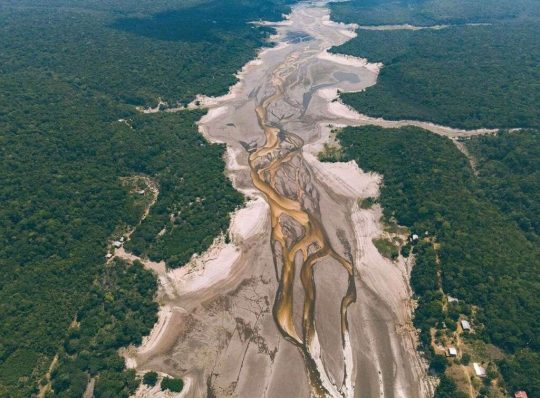
picture from Folha PE
there's a lot going on but I haven't seen much international buzz around this like there was when the forest was on fire (maybe because it's harder to shift the narrative to blame brazil exclusively as if the rest of the world didn't have fault in this) so I wanted to bring this to tumblr's attention
I don't know too many details as I live in the other side of the country and we are suffering from the exact opposite (at least three cyclones this year, honestly have stopped counting - it's unusual for us to get hit by even one - floods, landslides, we have a death toll, people are losing everything to the water), but like, I as a brazilian have literally never seen pictures of the river like this before. every single city in the amazonas state is in a state of emergency as of november 1st.
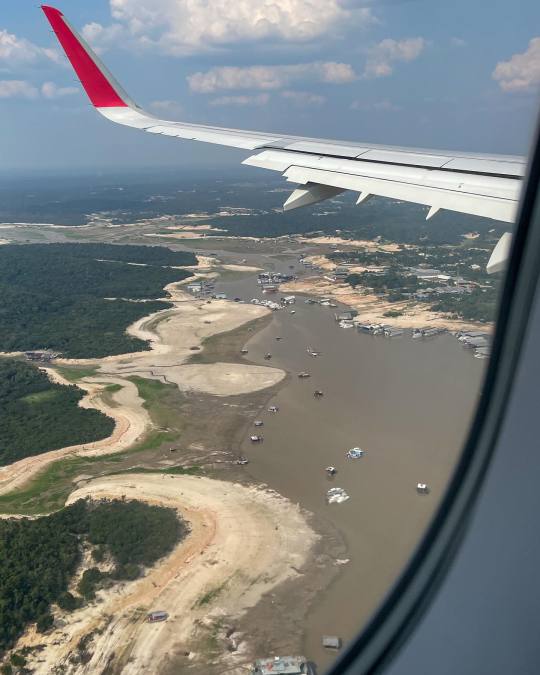
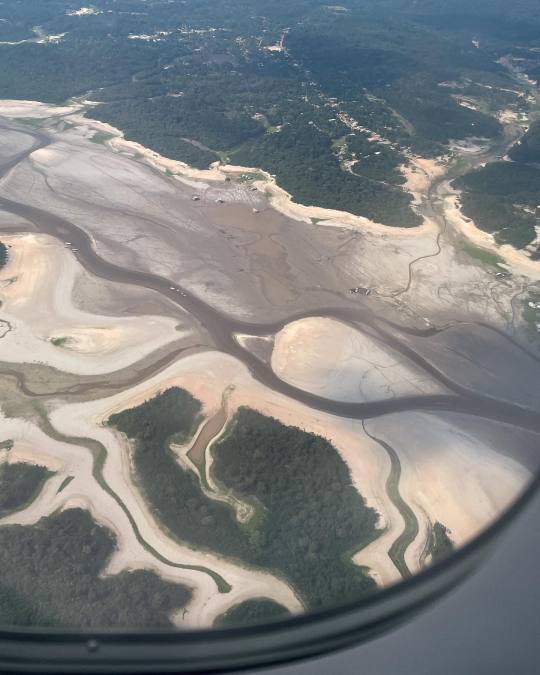
pictures by Adriano Liziero (ig: geopanoramas)
we are used to seeing images of rio negro and solimões, the two main amazon river affluents, in all their grandiose and beauty and seeing these pictures is really fucking chilling. some of our news outlets are saying the solimões has turned to a sand desert... can you imagine this watery sight turning into a desert in the span of a year?
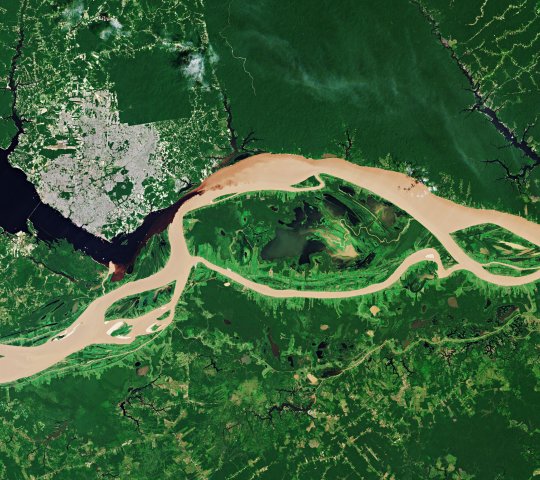
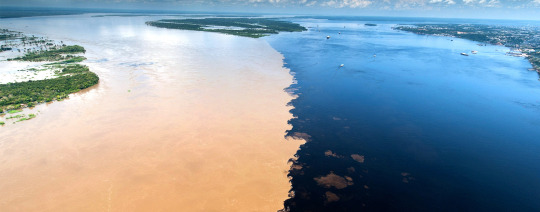
while down south we are seeing amounts of rain and hailstorms the likes of which our infrastructure is simply not built to deal with, up north people who have built everything around the river are at a loss of what to do.
the houses there that are built to float are just on the ground, people who depend on fishing for a living have to walk kilometers to find any fish that are still alive at all, the biodiversity there is at risk, and on an economic level it's hard to grasp how people from the northern states are getting by at all - the main means of transport for ANYTHING in that region is via the river water. this will impact the region for months to come. it doesnt make a lot of sense to build a lot of roads bc it's just better to use the waterway system, everything is built around or floats on the river after all. and like, the water level is so incomprehensibly low the boats are just STUCK. people are having a hard time getting from one place to another - keep in mind the widest parts of the river are over 10 km apart!!
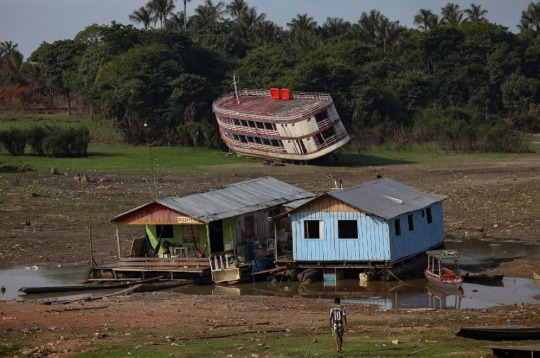
this shit is really serious and i am trying not to think about it because we have a different kind of problem to worry about down south but it's really terrifying when I stop to think about it. you already know the climate crisis is real and the effects are beyond preventable now (we're past global warming, get used to calling it "global boiling"). we'll be switching strategies to damage control from now on and like, this is what it's come to.
I don't like to be alarmist but it's hard not to be alarmed. I'm sorry that I can't end this post with very clear intructions on how people overseas can help, there really isn't much to do except hope the water level rises soon, maybe pray if you believe in something. in that regard we just have to keep pressing for change at a global level; local conditions only would not, COULD NOT be causing this - the amazon river is a CONTINENTAL body of water, it spans across multiple countries. so my advice is spread the word, let your representatives know that you're worried and you want change towards sustainability, degrowth and reduced carbon emissions, support your local NGOs, maybe join a cause, I don't know? I recommend reading on ecological and feminist economics though
however, I know you can help the affected riverine families by donating to organizations dedicated to helping the region. keep in mind a single US dollar, pound or euro is worth over 5x more in our currency so anything you donate at all will certainly help those affected.
FAS - Sustainable Amazon Fundation
Idesam - Sustainable Developent and Preservation Institute of Amazonas
Greenpeace Brasil - I know Greenpeace isn't the best but they're one of the few options I can think of that have a bridge to the international world and they are helping directly
There are a lot of other smaller/local NGOs but I'm not sure how you could donate to them from overseas, I'll leave some of them here anyway:
Projeto Gari
Caritás Brasileira
If you know any other organizations please link them, I'll be sure to reblog though my reach isn't a lot
thank you so much for reading this to the end, don't feel obligated to share but please do if you can! even if you just read up to here it means a lot to me that someone out there knows
also as an afterthought, I wanted to expand on why I think this hasn't made big news yet: because unlike the case of the 2020 forest fires, other countries have to hold themselves accountable when looking at this situation. while in 2020 it was easier to pretend the fires were all our fault and people were talking about taking the amazon away from us like they wouldn't do much worse. global superpowers have no more forests to speak of so I guess they've been eyeing what latin america still has. so like this bit of the post is just to say if you're thinking of saying anything of the sort, maybe think of what your own country has done to contribute to this instead of blaming brazil exclusively and saying the amazon should be protected by force or whatever
#solarpunk#sustainability#environmentalism#climate change#climate crisis#global warming#amazon rainforest#amazon river#geography#brazil#degrowth#punk#global boiling#ecopunk#anti capitalism#climate action#climate activism#the world does not die on my watch#i saw someone use that tag and uh i like it we should make it a thing#long post#:/ sorry i know no one likes lengthy bad news posts on their dashes but i've been thinking about this quite a bit#and i don't really know what to do to help bc i don't have money to donate and i am 10 thousand km away#i think i could be doing more to help but i am already trying my best#again dont feel obligated to share or read this but it would be nice and i would love you forever#have removed lbv from the post
7K notes
·
View notes
Photo
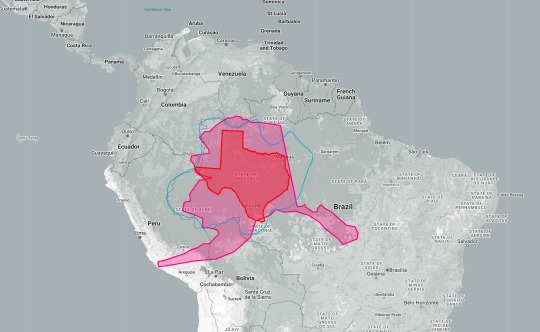
True size of Amazonas state in Brazil compared to Alaska and Texas
439 notes
·
View notes
Text
A Changing Climate Is Scorching the World’s Biggest River
As a punishing drought dries up stretches of the Amazon River, Brazil is resorting to dredging to try to keep food, medicine and people flowing along the watery superhighway.
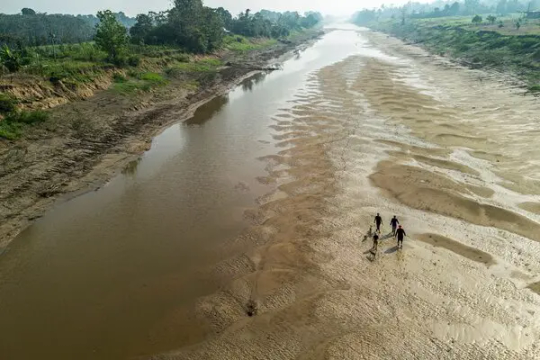
The world’s largest river is parched.
The Amazon River, battered by back-to-back droughts fueled by climate change, is drying up, with some stretches of the mighty waterway dwindling to shallow pools only a few feet deep.
Water levels along several sections of the Amazon River, which winds nearly 4,000 miles across South America, fell last month to their lowest level on record, according to figures from the Brazilian Geological Service.
In one stretch in the Brazilian state of Amazonas, the river was 25 feet below the average for this time of year, according to the agency, which began collecting data in 1967.
Parts of three of the Amazon River’s most important tributaries — major rivers in their own right, each spanning over 1,000 miles — have also fallen to historical lows.
The crisis has gridlocked the Amazon, a vital watery superhighway that serves as practically the only way to connect forest communities and move commerce around some of the most remote stretches on the planet.
Continue reading.
#brazil#brazilian politics#politics#environmentalism#environmental justice#amazon rainforest#climate change#image description in alt#mod nise da silveira
129 notes
·
View notes
Text
A Changing Climate Is Scorching the World’s Biggest River. (New York Times)

Excerpt from this New York Times story:
The world’s largest river is parched.
The Amazon River, battered by back-to-back droughts fueled by climate change, is drying up, with some stretches of the mighty waterway dwindling to shallow pools only a few feet deep.
Water levels along several sections of the Amazon River, which winds nearly 4,000 miles across South America, fell last month to their lowest level on record, according to figures from the Brazilian Geological Service.
In one stretch in the Brazilian state of Amazonas, the river was 25 feet below the average for this time of year, according to the agency, which began collecting data in 1967.
Parts of three of the Amazon River’s most important tributaries — major rivers in their own right, each spanning over 1,000 miles — have also fallen to historical lows.
The crisis has gridlocked the Amazon, a vital watery superhighway that serves as practically the only way to connect forest communities and move commerce around some of the most remote stretches on the planet.
Faced with a situation that shows no sign of abating, Brazil has resorted to an extraordinary measure that might have been unthinkable not too long ago: making the world’s largest river deeper.
Starting this month, the country plans to begin dredging sections of the river with the aim of ensuring that, even in times of drought, people and goods can keep moving through the rainforest.
“In some places, we can practically see the vegetation on the surface of the river,�� the water so low that plants on the riverbed are exposed, said Fabricio de Oliveira Galvão, the director of the National Department of Transport Infrastructure, a federal agency. “So, this limits navigation. People aren’t able to travel like this.”
The remarkable drop in water levels has left boats struggling to shuttle children to school, rush the sick to hospitals or deliver medicine and drinking water to distant villages.
73 notes
·
View notes
Text
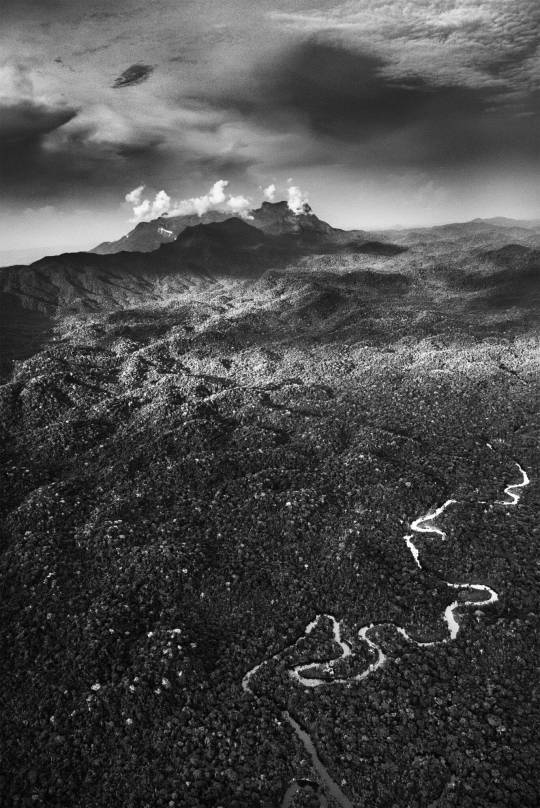
… untitled
The Maiá River in Pico da Neblina National Park, in the São Gabriel da Cachoeira area. Yanomami Indigenous Territory. State of Amazonas, 2018.
© Sebastião Salgado
87 notes
·
View notes
Text
we need to talk about a serious issue.
I am Brazilian, and in a state in Brazil, Amazonas, there is a huge fire going on and we need to talk about it urgently. The largest tropical forest in the world, the Amazônia, is being destroyed on a massive scale. The air in São Paulo is the most polluted in the world, people can't breathe well and the weather is very dry. I ask that you help spread the word about this, things are very serious and I want other people outside of Brazil to know what is happening and think about taking care of the environment in which they live so that the same disaster doesn't happen again.
That's it guys, thank you for your attention and I apologize if there are any errors in this text, my english is not the best.
kisses, dolpetite 🤍
70 notes
·
View notes
Text
I posted this on reddit, but I've seen some gnarly posts about Venezuela here, so I'll post it here too.
"I'll try to answer all of them. I don't know if I can explain like you're 5 because I'm autistic af and English is not my first language, but I hope I can make myself understood.
I condemn practically everything about the government. In Venezuela, on average, only four out of 10 operating rooms in the country's main hospitals are operative, and the shortage of supplies in emergency rooms is around 37%, while in operating rooms it reaches 74%. As for my own experience, I have Classical Ehlers-Danlos Syndrome, I had a shoulder subluxation and I still do, and I went to the Victorino Santaella hospital in my country, there's little personnel, to the point that in the area for traumatology you could see dry blood on the floor because there just wasn't enough people to clean it up. Not a little bit of blood, but a lot. If you want decent medical attention, you will have to pay a bunch of money.
I had a strangulated umbilical hernia, which again, is something that commonly happens with the EDS. My dad had to spend 4000$ dollars on the operation, which for us, is a unachievable amount of money. He had to sell his car, and beg his job for the rest of the money, because the car was old asf and only covered about 200$.
Many people say the government is progressive, it is not. In Venezuela the LGBTQ community has absolutely no rights, it's incredibly difficult for trans people to change their documents or access hormonal treatment. Abortion is not legal here, not even in rape cases, gay marriage isn't legal either, and domestic violence largely goes unpunished.
The minimum wage is around 3 dollars, my dad works in transit so he earns minimum wage, because I have so many medical emergencies he has to make illegal driving licenses in order for me to get treatment. It is incredibly hard for my mom to find a job.
If you want an overview of the whole political situation, this thread can explain it better than I can:
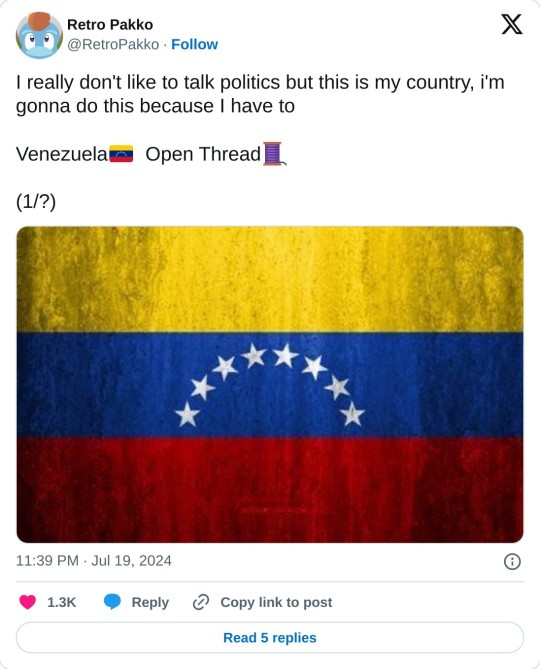
This also explains many of the faults with the government, really, there are too many, I can't count them all.
There’s also no freedom of speech in Venezuela due to Nicolas Maduro’s oppression. All the news channels that are available are on his side. CNNE was removed from Venezuela after doing a documentary on Maduro and also was DW. Our only way to inform ourselves are socials, and most venezuelans are speaking through there.
Maduro's government is not a socialist government anymore, it paints itself that way to outsiders, but it is not. Money that should be going to public institutions is not going to those institutions, hence why the hospitals are in such dire state and you have to pay for private clinics in order to get appropriate care. I don't know if you're familiar with the CLAP bags, The Local Supply and Production Committees (CLAP) is a distribution program of some basic imported foodstuffs promoted by the Venezuelan government since 2016 in which the communities themselves organized in committees supply and distribute priority foods through a modality of delivery of products, house by house at first, later distributed in a local of the community. The problem with these is that they're frequently infected with weevils, maggots, and even if they look "good" on the outside, they can be infected with bacteria and give you food poisoning. Worse is, some people are entirely reliant on these.
They're supposed to protect our indigenous people, but a Venezuelan indigenous leader who opposed the incursion of armed groups and illegal mining was shot twice while in a neighborhood in the capital of Amazonas state. Maduro is also the richest man in Venezuela.
In the protests that occurred in 2017, around 150 people died thanks to the armed forces and colectivos (paramilitaries on the side of the government), police came out with tanks (idk the name exactly in English) and ran over people who were peacefully protesting. Right now, I believe there has been 11 people confirmed injured, though there's probably more, since hospitals are asking for resources to treat the injured.
I think most of these payment methods are only available in Venezuela, but I saw a Paypal here and there, if you can help I'd thank you so much:
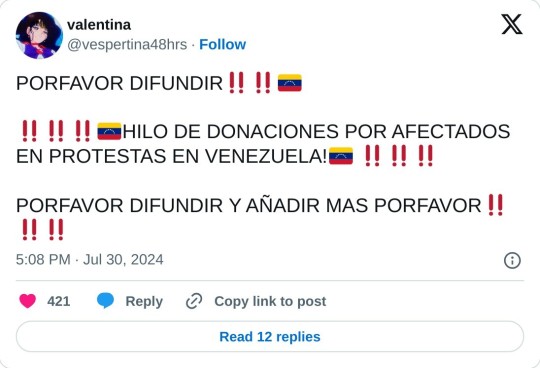
As for the self-sufficiency, I don't know. As I said, I'm 17 and heavily reliant on my parents. This country's also really not accessible for disabled people, I cannot go down stairs and have to walk with a cane, there's rarely a place where elevators are functioning properly: ironically, especially in hospitals. In the hospital Victorino Santaella, my dad has to carry me through a bunch of stairs, he has a bunch of hernias in his back so that's obviously no good for him. I'm also at heavy risk of fainting, so yeah.
Also: I don't know how the housing situation is in Venezuela statistic-wise, but for the young adults, is impossible to get a house. Houses can cost up to 100.000$ and more, the average job will pay enough for you to eat, buy toilet paper, basic needs and that's about it.
My friends, who were studying university, couldn't finish cause they had to get a job in a supermarket or bakery in order to be able to support their parent economically. It's horrible.
We also have no running water, when we do it's brown, our power goes off all the time and I have no health insurance"
Do I support María Corina? Or the opposition? I'm skeptical about them, they're still politicians, and Machado is a Zionist. I'm worried about idolizing these figures, deeply. But there's no alternative guys.
For gringos saying that we are supporting fascists, and whatnot. We have literally no other option. This didn't start with US sanctions, it just got WORSE with them. But these sanctions are a symptom, not the root of our problem.
Please, listen to venezuelan voices. If you're really a leftist, just a bit of research will be enough to convince you that this is NOT even a socialist government anymore.
#anarchocommunism#anarchopunk#anarchy#anarchist#anarcho syndicalism#socialism#venezuela libre#free venezuela#venezuela#politics#cripplepunk#cripple punk#is it ACAB until it's Venezuela?
70 notes
·
View notes
Text
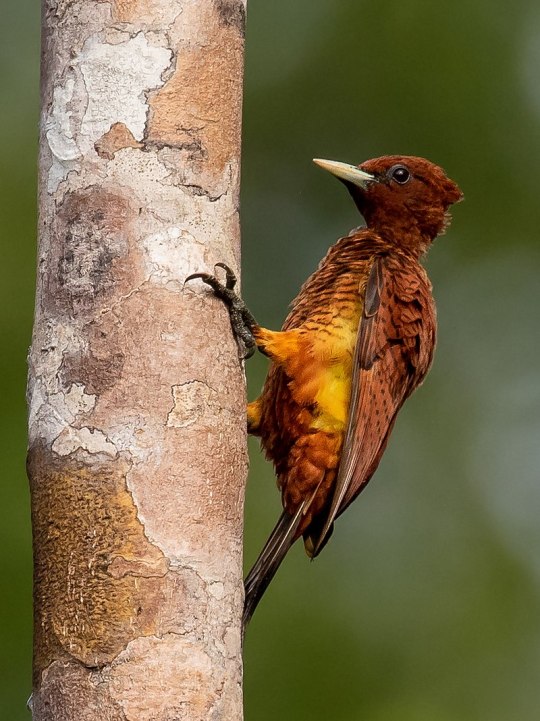
Scaly-breasted Woodpecker (Celeus undatus grammicus), female, family Picidae, Manacapuru, Amazonas state, Brazil
This is a subspecies of the Scale-breasted Woodpecker.
photograph by Hector Bottai
300 notes
·
View notes
Text





Queen Mary’s Engagements in Oct 2024:
01/10: Opening of Parliament
02/10: Official Visit to Brazil - Boat Trip on the Amazon, Adolpho Ducke Forest Reserve and the Amazonian Museum MUSA
02/10: Official Visit to Brazil - Official Reception by the Governor of Amazonas
03/10: Official Visit to Brazil - National Research Institute for the Amazon Forest, Center for Bioeconomy, Lunch
04/10: Official Visit to Brazil - Official Meeting with President of Brazil
04/10: Official Visit to Brazil - Public School, Agricultural Research Institute
04/10: Official Visit to Brazil - Working Dinner with UNFPA at Danish Embassy
05/10: Official Visit to Brazil - Botanical Garden with UNEP
08/10: State Visit from Iceland - Day 1
08/10: State Visit from Iceland - Banquet
09/10: State Visit from Iceland - Day 2
09/10: State Visit from Iceland - Return Event
10/10: State Visit from Iceland - Official Farewell
10/10: Christmas Seal
10/10: 25th Anniversary of the American Chamber of Commerce in Denmark
11/10: 750th Anniversary of Holstebro City
21/10: Official Visit to Germany - Official Welcome at Schloss Bellevue, Reception at the Bundestag
21/10: Official Visit to Germany - Nordic Embassy Complex 25th Anniversary
21/10: Official Visit to Germany - Official Dinner
22/10: Official Visit to Germany - Official Welcome in Schleswig-Holstein, Sailing Tour, Energy Conference at GEOMAR, Danevirke, Flensborghus
37 notes
·
View notes
Note
I am watching a video with criticism of geographical determinism in worldbuilding and realized that I don't really remember seeing any fictional stereotypic merchant state that relies on rivers.
Norse and Rus were whom I had in mind, but to my knowledge British and Japanese people also heavily utilized rivers for trade and I would be very surprised if Ancient Chinese people didn't.
I don't know about history of First Nations of North America and did they have trade in our understanding, but I heard that river system of North America is so convenient that the entire 19th century demand for transportation could have been covered by it alone, without trains.
Just some ideas
Freshwater systems are woefully underused in worldbuilding. The other day I was reading about the history of my region and I was amazed at how big and sophisticated native canoes were in the Paraná, the Paraguay and the Amazonas, and how virtually nobody talks about it. We are talking about ships that could hold about 30 people and some were bigger than Columbus caravels. For centuries into the colonial era, the Spanish and Portuguese hired or pressed into service native navigators for the rivers which were though to navigate as a sea. Still before that, they were the major arteries of commerce and trade through the continent, this is well known. Even Patagonian goods are reported in Corrientes (North of Argentina) which indicates that trade there got very far. As for the Chinese, not only rivers were important to the but also they boasted an amazing canal system but that's about all I know.
One thing I learned recently about rivers and cities is that cities were often founded on the side of rivers, yes, but almost never at their mouth. Look for example at Paris, Rome, London, the Egyptian capitals. They were founded by the river, but the mouth of the river next to the sea is where the delta is, and deltas always change and flood, carrying mud and slit, they aren't good places to build at all. Good river cities are built in the 'deep side' of the river where you can build ports, not in the side where sediment accumulates. Another issue with river cities are marshlands. For example, I remember reading that the marshlands of ancient Rome were drained at great cost. Ancient peoples knew that marshes were 'unsanitary' even if they didn't know why (it's because they host mosquitos and parasites, not because of anything bad wetlands have on itself) and they had to deal with them. There are some exceptions to this, like Venice which was basically built on a marshland (or the Netherlands).
And indeed rivers were (and still are! I see ships going up and down the Paraná every weekend!) a very efficient way of transportation. There's lots about it written in Europe, but river barges were basically the railroads of their time. Before the advent of railroads, people in Europe (and China) weren't thinking roads, but canals, the French built a lot of canals at great expense which became obsolete later by railroad.
Unfortunately the sources about river canoes and transportation in America (continent) are often tucked away in papers and history books, there really isn't that much accessible literature and illustrations about it. Which is a goddamn shame because learning about native canoes bigger than Spanish caravels (and they were still building them in Paraguay and Argentina during colonial times, according to my sources) blew my mind.
70 notes
·
View notes
Text
"Brazilian President Luiz Inácio Lula da Silva legally recognized nearly 800 square miles of Indigenous lands on Friday [April 28, 2023] in an effort to stop illegal logging, mining and land grabbing, reversing policies enacted by his predecessor Jair Bolsonaro, a far-right leader who encouraged development in the Amazon. Those policies spurred a frenzy of activity, including illegal gold mining and clandestine farming in Indigenous territories, devastating the environment and fueling violence.
“We are going to legalize Indigenous lands,” Lula said in a speech. “I don’t want any Indigenous territory to be left without demarcation during my government.”
Under Lula’s new designation, mining activities are now prohibited, and commercial farming and logging require specific authorization by the Brazilian government. Non-Indigenous people are forbidden from engaging in any economic activity on Indigenous lands. Under Bolsonaro, the Amazon saw a 56 percent increase in deforestation, the destruction of nearly 13,000 square miles of rainforest, and the loss of nearly 965 square miles of Indigenous territories.
The Amazon rainforest, which is twice the size of India, holds large amounts of carbon which are crucial to fighting climate change. Studies show that protected Indigenous land holds 50 percent more carbon per hectare than unprotected areas in the Brazilian Amazon, and that protecting Indigenous territories in the region could prevent more than 15 million respiratory and cardiovascular-related illnesses. There are more than 3,000 protected areas in Brazil, and 490 recognized Indigenous areas. Those Indigenous areas cover more than 264-million acres – almost 13% of Brazil’s territory.
“Indigenous areas are crucial to preserving the Amazon, the world’s central bank for biological diversity,” said Toerris Jaeger, Director of Rainforest Foundation Norway, in a press release. “Today’s announcement is also an important recognition that indigenous people are the ones best able to guard this wealth.”
Lula’s announcement provides recognition to six territories that are home to nearly 4,000 Indigenous peoples. The largest area is the Nadöb people’s Uneiuxi Territory located in the Amazonas state. With recognition, the area has been expanded by 37 percent to 2,100 square miles of primary rainforest.
But for some Indigenous communities, the announcement fell short. In January, Lula’s government pledged to create 14 new territories, while another 733 territories await distinction and boundary acknowledgment by the federal government. The lands of the Pataxó people in south western Bahia state is just one of the territories left out of Lula’s announcement. Renato Atxuab, a Pataxó leader, told the AP that Silva’s government must distinguish their land as soon as possible to prevent further invasions by outsiders. Over the past year, Axtuab said, there have been violent conflicts involving agribusiness, land-grabbers and drug traffickers.
“There are still, currently, hundreds of Indigenous Lands in the country with their recognition processes pending,” said Danicley de Aguiar, a spokesperson for Greenpeace Brazil. “Several territories, despite already being officially recognized, suffer from invasions by illegal gold miners, subjecting the people living on those lands to extreme violence.”
She added that going forward, real protection of Indigenous lands will require monitoring by the Brazilian government."
-via Grist, 5/3/23
#brazil#lula da silva#indigenous#indigenous sovereignty#indigenous peoples#bolsonaro#amazon#amazon rainforest#biodiversity#conservation news#land back#south america#logging#good news#hope
319 notes
·
View notes